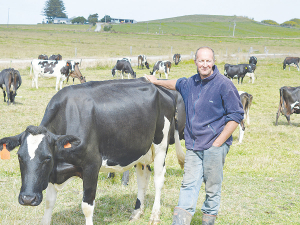Nestle reportedly withdraws from methane accord
The ACT Party says media reports that global dairy giant Nestle has withdrawn from the Dairy Methane Action Alliance shows why New Zealand needs to rethink its approach to climate.
 ACT primary industries spokesman Mark Cameron says the Far North District Council has done the right thing by pausing the mapping of Significant Natural Areas (SNAs) in the region.
ACT primary industries spokesman Mark Cameron says the Far North District Council has done the right thing by pausing the mapping of Significant Natural Areas (SNAs) in the region.
The Far North Council is being praised by ACT primary industries spokesman and Ruawai farmer Mark Cameron for dropping the contentious Significant Natural Areas (SNAs) mapping policy.
Cameron claims that private property rights are under threat thanks to the Government's directive to councils to identify and manage SNAs.
Cameron attended at protest meeting in Northland last month when more than 500 people called on the council to drop SNAs policy.
SNAs were brought in under the Resource Management Act in 1991 when councils were charged with identifying and protecting areas with significant habitats of indigenous biodiversity.
Around 60% of councils have identified SNAs but the Government admits the work has not been done in a consistent way due to lack of clarity.
That has led to loud opposition from farmers and iwi and some councils have scrapped or shelved the process.
The Far North District Council voted recently to continue developing the content for the draft District Plan, but to remove SNA maps developed by ecologists from the document.
The council's strategy and policy committee chair Councillor Rachel Smith says the decision endorses an undertaking Mayor John Carter made in June to 'pause' the mapping of SNAs.
"This followed protests by tangata whenua, farmers and other landowners who said the proposal to identify land as SNAs undermined their sovereignty and property rights.
"This opposition culminated in a large hikoi to the Council's Kaikohe headquarters where tangata whenua delivered a petition against the process," she says.
"Our decision provides a clear way forward for our draft district plan, while acknowledging more direction is needed from central government on how to support landowners to protect significant species and habitats."
Cameron believes the council has done the right thing because "the depth of feeling was clear, people were angry and worried about this policy".
"SNAs undermine conservation efforts by the people who care most about the environment. Farmers have the biggest incentive to care about the environment because they make a living from it.
"If you take away property rights, there's no incentive to be a conservationist. Who would be a conservationist on their own land if the reward is getting your land confiscated? Countries without property rights are environmental disasters.
"Actively punishing people if they look after their wetlands is among the worst policies this Government has put in place.
"There's a better way. Landowners, councils and conservationists already work together to protect indigenous biodiversity. Instead of land grabs, the Government should be supporting these pre-existing efforts."
One young couple is proving farm ownership is still within reach for young Kiwis.
Greenlea Premier Meats managing director Anthony (Tony) Egan says receiving the officer of the New Zealand Order of Merit (ONZM) honour has been humbling.
Waikato dairy farmer Neil Bateup, made a companion of the New Zealand Order of Merit (CNZM) in the New Year 2026 Honours list, says he’s grateful for the award.
Another Australian state has given the green light to virtual fencing, opening another market for Kiwi company Halter.
Farmer interest continues to grow as a Massey University research project to determine the benefits or otherwise of the self-shedding Wiltshire sheep is underway. The project is five years in and has two more years to go. It was done mainly in the light of low wool prices and the cost of shearing. Peter Burke recently went along to the annual field day held Massey's Riverside farm in the Wairarapa.
Applications are now open for the 2026 NZI Rural Women Business Awards, set to be held at Parliament on 23 July.